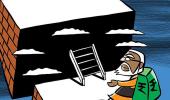But the government will present a second tranche of Supplementary Demands for Grants during the Budget session of Parliament in February, when it can seek additional spending.

In a sign of fiscal prudence ahead of the 2024 general elections, the Union finance ministry sought Parliament's approval for additional gross spending of Rs 1.29 trillion, involving net cash outgo of Rs 58,378 crore (Rs 583.78 billion) in FY24 through the first tranche of Supplementary Demands for Grants.
In comparison, in the first Supplementary Demands for Grants in FY23, the government had sought approval for gross additional expenditure of nearly Rs 4.36 trillion, with a net cash outgo of Rs 3.25 trillion.
But the government will present a second tranche of Supplementary Demands for Grants during the Budget session of Parliament in February, when it can seek additional spending.
Expenditure exceeding the net cash outflow, worth Rs 70,968 crore (Rs 709.68 billion), including Rs 14,524 crore (Rs 145.24 billion) for the Mahatma Gandhi National Rural Employment Guarantee Scheme, will be offset by savings or increased receipts.
The government had previously taken an advance of Rs 10,000 crore (Rs 100 billion) for the rural job guarantee scheme from the Contingency Fund of India.
Supplementary demands involve entirely new items of expenditure that were not included in the Budget (new services) and significant increases in existing lines of expenditure (new instruments of services).
The additional spending demands are primarily for fertiliser (Rs 13,351 crore/Rs 133.51 billion) and food (Rs 10,396 crore/Rs 103.96 billion) subsidies, the Guarantee Redemption Fund (Rs 9,014 crore/Rs 90.14 billion), and defence spending (Rs 5,626 crore/Rs 56.26 billion).
"The net cash outflow in the Supplementary Demands for Grants is moderate and could be offset by savings in other departments. This does not suggest a risk of overshooting the fiscal deficit target," says Aditi Nayar, chief economist at ICRA.
Of the Rs 58,378 crore net cash outflow, Rs 53,858 crore (Rs 538.58 billion) has been allocated for revenue expenditure and Rs 4,520 crore for capital expenditure.
Rs 13,351 crore (Rs 133.51 billion) has been allocated for the Nutrient Based Subsidy Scheme, including the recoupment of an advance of Rs 5,000 crore (Rs 50 billion) sanctioned from the Contingency Fund of India, and Rs 5,589 crore (Rs 55.89 billion) for the Pradhan Mantri Garib Kalyan Anna Yojana (PMGKAY), which was extended for five years beyond December 31, 2023, when it was supposed to end.

Madan Sabnavis, chief economist at Bank of Baroda, said the government has made conservative assumptions for fertiliser subsidies based on gas prices and has allocated more funds for the rural job guarantee scheme as the rural economy is not performing well.
"At any rate, before the general elections, it would be necessary to ensure the rural economy is resilient. Now, under ceteris paribus conditions, the fiscal deficit will increase by the net amount of around Rs 58,000 crore. But GDP at nominal prices will be higher, and hence the ratio can be contained at 5.9 per cent," he explained.
The government has set a fiscal deficit target of 5.9 per cent of GDP for FY24.
During the first seven months of the financial year (April-October), the government had used only 45 per cent of its fiscal deficit target of Rs 17.9 trillion.
Although nominal GDP came in at 8.6 per cent during the first half (April-September) of FY24, against the Budget Estimate of 10.8 per cent, the government is confident of meeting the fiscal deficit target due to robust tax collections.
The finance ministry has allocated Rs 3,170 crore (Rs 31.70 billion) for additional expenditure towards central assistance to meet the resource gap of Jammu and Kashmir, Rs 2,537 crore (Rs 25.37 billion) for clearing the liability of the government's share towards the election-related expenditure, and Rs 1,050 crore (Rs 10.50 billion) for interest equalisation support for lines of credit under the Indian Development and Economic Assistance Scheme.
Feature Presentation: Aslam Hunani/Rediff.com












 © 2025
© 2025